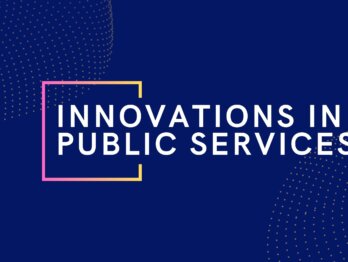Reflecting on Global Innovation Trends 2020

Since 2016, OPSI and the UAE Mohammed Bin Rashid Centre for Government Innovation (MBRCGI) have worked in partnership to surface key activities and case studies in public sector innovation, resulting in a series of annual reports on key innovation trends. However, this year is not a normal year, with 2020 being one of the most challenging years in most of our lifetimes. The COVID-19 pandemic has rapidly and drastically changed the daily lives of nearly everyone, with more than half of the world’s population placed in lockdown at some point, the most severe economic recession in nearly a century, the collapse of economic activity by as much as 20-30% in some countries, record levels of unemployment, overwhelmed healthcare systems pushed to the brink of collapse and, tragically, hundreds of thousands of deaths. Few governments have been prepared to deal with a crisis of this nature, and all governments are working to grapple with its ramifications.
As if coping with the COVID-19 crisis was not enough, governments have also had to deal with accelerating technological shifts that are fundamentally changing the ways in which people live and interact with government. The ever-growing and interconnected ecosystem of citizens and other stakeholders is demanding more of government and expecting better performance, resulting in increasingly complex and unpredictable challenges and future scenarios. In the face of such challenges, governments need to understand, test and embed new ways of doing things. OPSI and the MBRCGI believe that innovation is imperative to success in moving forward. In a chaotic situation with no precedent and no playbook, governments and their partners have few other choices but to act in new ways as they enter uncharted territory.
It is with this belief, and in the context of a tremendously tumultuous year, that we have pushed forward with our partnership to uncover how governments are confronting these challenges. We have conducted extensive research, held a global Call for Innovations crowdsourcing exercise, analysed over 400 innovative COVID-19 responses, and met with innovative teams from around the world to surface key trends, examples and stories. Through this work, OPSI and the MBRCGI have found that governments have devised ambitious, focused and innovative ideas and solutions, under exceptional circumstances. While this year has been extremely difficult, it also represents a potential catalyst for change that governments have shown they can seize. Our 2020 partnership has culminated in a series of five reports that cover government innovation efforts more deeply than we have ever done before, which was officially launched at a dedicated session at OPSI’s Government After Shock event on 18 November, as discussed below.
Series of reports highlights key trends and real-world case studies
Under normal circumstances, OPSI and the MBRCGI issue one report each year on key trends in government innovation. However, in recent months, we have seen a flurry of innovation activities, actions, and initiatives led by governments around the world, as well as their partners in industry and civil society. A great deal of this energy has deservedly been dedicated to coping with the ongoing crisis, but public sector innovation efforts go far beyond this issue, as governments are rapidly working to address a number of other major challenges. The unprecedented level of government-led change has warranted a different approach for our 2020 work. Thus, instead of one report recapping trends, we have issued a series of five reports, with each digging in-depth into the latest trends and key trends, with dozens of examples and case studies of real-world action.

In particular, we have found that government innovation efforts have focused most strongly on:
- Designing and implementing Innovative Responses to the COVID-19 Crisis in order to confront its consequences and impacts, and over time, move towards recovery.
- Bringing about Seamless Government by innovating to eliminate points of friction with those they serve and actively shaping tomorrow’s possibilities with action today.
- Focusing on the Overlooked by using innovative approaches to provide new opportunities for disadvantaged and underserved groups.
- Navigating the tensions Public Provider versus Big Brother through innovative services that leverage data harvesting and biometrics, such as facial recognition, while trying to avoid the ethical dilemmas posed by the use of such technologies.
- Upskilling and Investing in People in innovative ways, including investing in the public as a critical resource, as well as upskilling the public service to unlock the potential of government.
Each of these reports is available at trends.oecd-opsi.org, and each features three deep-dive case studies that illustrates the trends with real-world government innovation actions.
Talks and personal reflections by innovators at Government After Shock
The 2020 Global Trends project was capped off at a dedicated session of OPSI’s event Government After Shock: An unconventional event for unconventional times. This session featured opening remarks from both of us about the continued partnership between OPSI and the MBRCGI, the launch of the fifth and final trends report, and talks and moderated discussion among the leaders behind four of the top case studies featured in the 2020 series of reports. The featured innovation leaders were:
- Abeer Tahlak, Director of the MBRCGI, gave a talk on the UAE’s Ministry of Possibilities, a collection of temporary, “time-bound departments” that seek to answer impossible questions (featured in the second report).
- Mikk Vainik, Head of Accelerate Estonia, presented on Hack the Crisis and the Global Hack, 48-hour hackathons dedicated to building solutions to help grapple with the COVID-19 crisis (featured in the first report).
- Sue Stevenson, Director of Strategic Partnerships and International Development for Barefoot College International, gave a talk about Barefoot College and its efforts to train women from rural communities to become electrical engineers in order to bring solar electricity to their villages (featured in the third report).
- Teemu Roos, Professor of Computer Science at the University of Helsinki, presented on Finland’s Elements of AI, a free, globally open, online course devoted to AI concepts, their societal implications and the building of AI systems.
The speakers also discussed some of the key success factors behind their work and how to leverage the innovation momentum that has been building throughout 2020 and propel it into 2021. You can hear the opening remarks, talks, and other insights from the participants at the video below.
Stay tuned for future work from OPSI and the MBRCGI
While our joint efforts for 2020 are winding down, we are just getting started behind the scenes with ramping up for 2021. We are excited to share with you details on our new cycle of work soon. In the meantime, we encourage you to check out the series of 2020 reports. To be alerted to future updates on our work and other activities in the public sector innovation community, you can subscribe to OPSI’s newsletter, follow OPSI on Twitter @OPSIgov, follow the MBRCGI on Twitter @MBRinnovation, and join the OPSI LinkedIn page.











